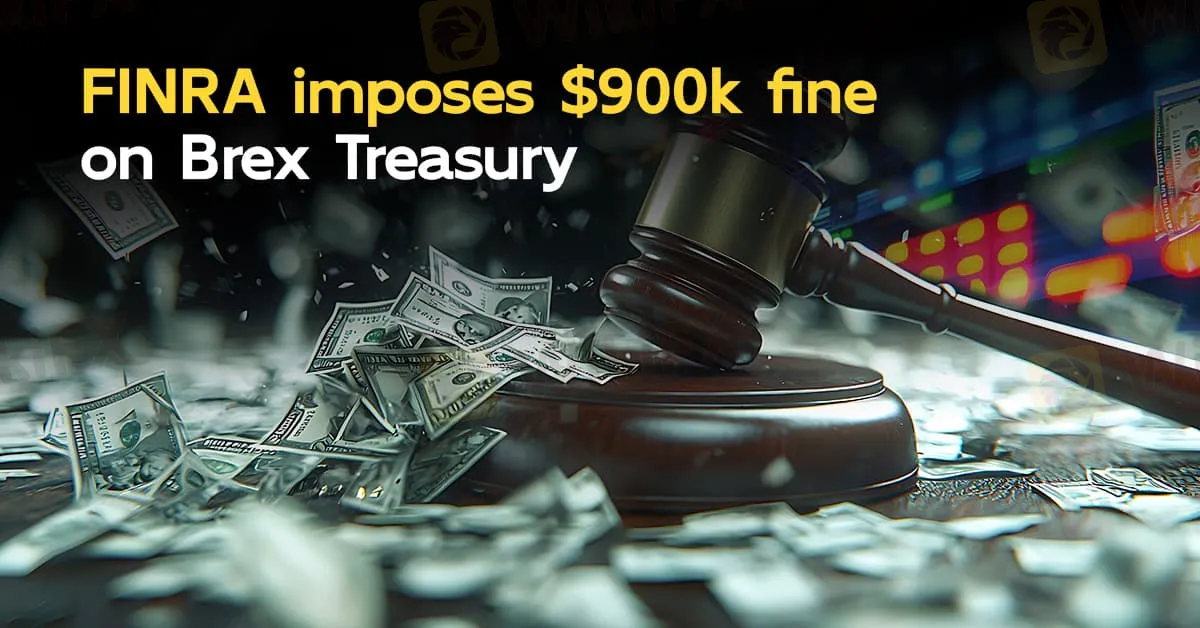简体中文
繁體中文
English
Pусский
日本語
ภาษาไทย
Tiếng Việt
Bahasa Indonesia
Español
हिन्दी
Filippiiniläinen
Français
Deutsch
Português
Türkçe
한국어
العربية
FINRA imposes $900k fine on Brex Treasury
Abstract:Brex Treasury LLC has reached a settlement with the Financial Industry Regulatory Authority (FINRA) to resolve allegations related to its anti-money laundering (AML) compliance practices. As part of the settlement, Brex Treasury has agreed to pay a fine of $900,000 and accept a censure.

Brex Treasury LLC has reached a settlement with the Financial Industry Regulatory Authority (FINRA) to resolve allegations related to its anti-money laundering (AML) compliance practices. As part of the settlement, Brex Treasury has agreed to pay a fine of $900,000 and accept a censure.
The settlement stems from Brex Treasurys use of an automated identity-verification algorithm that failed to meet AML requirements. The algorithm, which was intended to verify the identities of beneficial owners and customers, had several critical shortcomings.
Algorithm Design Flaws
Initially, Brex Treasurys identity-verification system relied on a limited set of customer information—names and phone numbers—to match identities with those in third-party databases. This approach proved inadequate, as it did not collect all the necessary identifying details, such as dates of birth, addresses, or identification numbers, required under the Bank Secrecy Act (BSA) regulations.
In January 2021, the firm began collecting more comprehensive data, including names, dates of birth, addresses, and identification numbers. Despite this, the system still fell short. The algorithm was designed to approve accounts based on matches in vendor databases, but it did not adequately address discrepancies in the date of birth or address, which could signal potential identity fraud.
Fraud Check Limitations
Brex Treasurys automated fraud checks, which included an external fraud score from a third-party vendor, were also insufficiently rigorous. The fraud score, intended to assess the risk of identity fraud, was not always accompanied by thorough manual reviews of discrepancies flagged during fraud checks. As a result, the firm approved accounts that had significant red flags.
Inadequate Manual Reviews
The firms manual customer screening process was equally flawed. From 2020 to 2021, Brex Treasury approved hundreds of potentially fraudulent accounts. These accounts attempted transactions exceeding $15 million using funds that failed to settle. Many deposits were recalled or rejected due to issues such as insufficient funds, leaving the firm unable to recover the funds or verify customer identities.
Regulatory Violations
The failures in Brex Treasury‘s AML practices led to violations of FINRA Rules 3310(b) and 2010. These rules mandate that firms maintain adequate policies and procedures for AML compliance. The firm’s inability to effectively vet customer identities and prevent fraudulent transactions highlighted significant gaps in its compliance framework.
Settlement Details
In addition to the $900,000 fine, Brex Treasury has agreed to a censure as part of the settlement with FINRA. The censure and financial penalty underscore the importance of robust AML practices and the need for firms to ensure that their identity verification systems are designed to meet regulatory standards.
This settlement serves as a reminder for financial institutions to continuously evaluate and improve their compliance mechanisms to prevent similar lapses and protect against financial crime.

Disclaimer:
The views in this article only represent the author's personal views, and do not constitute investment advice on this platform. This platform does not guarantee the accuracy, completeness and timeliness of the information in the article, and will not be liable for any loss caused by the use of or reliance on the information in the article.
Read more

Doo Financial Expands Regulatory Reach with Offshore Licenses in BVI and Cayman Islands
According to the report, Doo Group, a prominent Singapore-based online brokerage firm, has strengthened its global presence by securing new offshore licenses for its brokerage brand, Doo Financial. The company recently announced that entities under the Doo Financial umbrella have been granted licenses by two key offshore regulatory bodies: the British Virgin Islands Financial Services Commission (BVI FSC) and the Cayman Islands Monetary Authority (CIMA).

The Hidden Checklist: Five Unconventional Steps to Vet Your Broker
Forex broker scams continue to evolve, employing new tactics to appear credible and mislead unsuspecting traders. Identifying these fraudulent schemes requires vigilance and strategies beyond the usual advice. Here are five effective methods to help traders assess the legitimacy of a forex broker and avoid potential pitfalls.

Doo Financial Obtains Licenses in BVI and Cayman Islands
Doo Financial, a subsidiary of Singapore-based Doo Group, has expanded its regulatory footprint by securing new offshore licenses from the British Virgin Islands Financial Services Commission (BVI FSC) and the Cayman Islands Monetary Authority (CIMA).

CFI’s New Initiative Aims to Promote Transparency in Trading
A new programme has been launched by CFI to address the growing need for transparency and awareness in online trading. Named “Trading Transparency+: Empowering Awareness and Clarity in Trading,” the initiative seeks to combat misinformation and equip individuals with resources to evaluate whether trading aligns with their financial goals and circumstances.
WikiFX Broker
Latest News
AIMS Broker Review
The Hidden Checklist: Five Unconventional Steps to Vet Your Broker
Russia to Fully Ban Crypto Mining in 10 Regions Starting January 1, 2025
YAMARKETS' Jingle Bells Christmas Offer!
Why is there so much exposure against PrimeX Capital?
Doo Financial Expands Regulatory Reach with Offshore Licenses in BVI and Cayman Islands
MTrading’s 2025 "Welcome Bonus" is Here
Doo Financial Obtains Licenses in BVI and Cayman Islands
CFI’s New Initiative Aims to Promote Transparency in Trading
Currency Calculator


